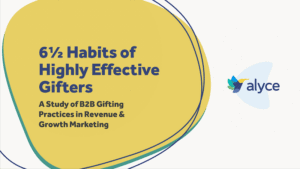
There’s no shortage of horrible corporate gifts.
Here are 5 eye-opening findings from our gifting industry report that changed the meaning of our corporate gifting philosophy.
Can you remember the last few gifts that you were given, what they were, or who got them for you? Think of what you’ve received over the years. How many of those gifts were gift cards, bottles of wine, or gift baskets?
Pretty lame, right? (Hey, I’m sure Tom, your accountant meant well with that logoed bottle opener. He knows you like wine, and it was sent with good intention. But there’s noooo waaaaay he could have known you had ten others stuffed in a drawer, right?)
We’ve been guilty of sending lame corporate gifts in the past and have received too many to count. Think about this corporate gifting statistic:
There are 5.7 million companies in the US, and amazingly, the average spend on corporate gifting each year is $21,000.
That’s a total of $120 billion (yes with a “B”) in corporate gifts every year. Holy guacamole!
Corporate gifting is a $120 billion industry built on the hopes of people wanting to strengthen business relationships, decrease churn, increase brand awareness, retain employees, and more.
As Greg Segall, our CEO found out: “over 90% of what happens in the gifting industry is currently untracked in CRMs, unmeasured for ROI, sent at expected times and especially… irrelevant to the gift recipient.”
The corporate gifting industry has continued to separate itself from the people whom it was intended to please: the gift recipients. Your valued customers, employees, and prospects. Most corporate gifting advice is contradictory, if not biased. Above all, it has failed to help gifters address the needs of the gift recipients in order to build stronger one-to-one relationships.
We realized a different perspective was required to understand the wants of gift recipients. So, a month ago, we embarked on a survey to help shed light and clarify some of our most burning questions about the $120 billion corporate gifting market:
- What types of gifts do people actually want?
- How and when should you send a gift to make the greatest positive impact?
- What happens with the $21B spent each year on swag?
- Can a single gift make or break your business relationship?
- What is the future of corporate gifting?
More than 500 people from companies like Salesforce, Moz, and Verizon filled out our survey and the results began to uncover the truth: corporate gifting has taken a wrong turn and you as a gifter are most likely following behind… No one likes a tailgater.
Get ready to lead the charge in a new direction towards smarter gifting.
1 What types of gifts do people actually want?
70% of people want a gift that has been uniquely matched based on their interests
First off, we learned that most people would rather not receive generic gifts like a fruit basket or corporate swag. 7 out of 10 people (70.22%) want to receive a gift that has been uniquely picked for them, based on their personal interests.
Heck, we live in the era of hyper-personalization and expect things to be tailored to us. Tell us you don’t cringe when you receive an email to “Hi all”. We like emails sent to “Hi Tom”, not “Hi Thomas” (I’d reserve the second one only for my mom). Our names are written on the coffee cups we pick up at the local coffee shop and embroidered on the pillow cases at our favorite hotel. We like to feel special; it matters to us.
Data shows people genuinely appreciate the level of thoughtfulness a uniquely picked gift has. In fact, a uniquely picked gift will encourage 70.57% of people to continue to do business with a company, while swag will discourage 10.72% from doing so.

And when it comes to employee recognition gifts…
81% of the time, a uniquely picked gift from an employer will create a positive impact on their employees.
#MicDrop
Still not convinced? Researchers at Northwestern University conducted a study that explains, from a scientific perspective, why unique gifts tend to create a stronger impact than generic gifts such as gift cards and swag.
Participants who received a unique gift were highly satisfied because these gifts are “customized to the wants and needs of the recipient”. Unique gifts allowed people to enjoy the experience of using the gifts, and stop worrying about their monetary value. Hence the reason why unique gifts feel more like real rewards compared to generic gifts.
Also, giving the right gift, at the right time ensures that…
“The nucleus accumbens, the brain’s reward circuit, activates not just when a reward is received, but [it also] activates in anticipation of the reward.”
Which explains why 72.95% of people prefer to get a corporate gift at significant business milestones rather than at an expected time like the holidays. Good business milestones to send a gift are customer anniversaries, contract renewals, thank-yous, KPI milestones, etc.
73% of people prefer to get a corporate gift at significant business milestones

It is the combination of sending the right gift, at the right time that delights a person and creates a uniquely memorable, one-to-one relationship between the sender and the recipient.
Are you looking to make your marketing and sales more personal? Check out our Ultimate Guide to Personal Experience for tips.
2 How and when should you send a gift to make the greatest positive impact?
One out of every six corporate gifts (61.6%) go out during the holiday season. Making festivities, the most predictable and least impactful time to send a business gift.
Gift At The Right Time: 73% believe gifting is more meaningful when done outside of the holiday season
Gift smarter, be remarkable. Aim to gift strategically for moments that mean the most to your relationship — whether that’s a customer anniversary, contract renewal, KPI milestone, an internal revenue goal, thank-you, etc.
Send The Right Gift: 70% would like to receive a gift that has been uniquely picked based on their personal interests.
Getting a fruit basket once might be fun, but after getting your nth fruit basket, your level of excitement fades. BTW, the same goes for paperweights, wine, and fleece jackets.
Yes, I know it’s easy to fall back on generic, one-size-fits-all gifts. These sorts of gestures are unfortunately quickly forgotten and ultimately wasteful on many levels. Everyone is different, and they deserve to be treated as such.
3 What happens with the $21B spent each year on branded swag?
Fact: 90% of people do not want swag as a corporate gift.

The biggest opportunity forgone by companies that gift swag is the wasted potential of an improved relationship. They happen thanks to the positive emotions evoked when the gifts are used or consumed, not when the gifts are received. And psychologists argue that swag fails to provide an experiential feeling for the gift recipient in the way that a unique gift does.
And bad news for your HR department. Data suggests that employers who gift swag to their team are 13 times more likely to hurt their professional relationships, compared to those who send a uniquely picked gift.
Wait… I thought swag was a great brand awareness tool?
Me too.
That’s because, for years, promotional swag companies have been paying for misleading studies. These studies claimed that each piece of gifted swag would get around 6,000 impressions, and the CPI (cost per impression) was lower than any other form of advertising known to humankind.
But let’s take a second to look quickly at people’s confessions on what they end up doing to the swag they receive:
In 91% of cases, people do not regularly use swag in public

As a matter of fact, most people either use swag at home (62.33%), or they just trash it right away (23.47%). Which leave us wondering, how on Earth can a branded mousepad sitting on your table get anything more than 100 unique impressions?
If you are looking to generate brand awareness, buy some display ads or put up a billboard. Don’t trick people into becoming a brand awareness tool. A corporate gift is meant to be a gift offered without obligation to a selected recipient, as an expression of appreciation or goodwill. It’s a chance to build better relationships, nothing else.
Outstanding companies like Slack, MailChimp, Zendesk and Zendesk alternatives did not get where they are today by tricking us to become walking billboards, or fill out lead forms so that they can then bombard us with emails and sales calls. These amazing brands got where they are today because they are truly interested in building genuine, one-to-one personal relationships.
And that is the secret sauce of winners — they value one-to-one relationships and thus, can create an amazing customer experience with every single interaction. These are the companies we tell our friends about.
4 Can a single gift make or break your business relationship?
A uniquely picked gift will encourage 71% of people to continue to do business with a company
In 70.57% of the cases, a $50 gift that has been uniquely picked will encourage them to continue to do business (i.e. contract/subscription renewal, etc.) with a company.
More than the price of the unique gift itself, it is the intent and dedication to delight that counts. People like to be treated like individuals and a uniquely picked gift shows appreciation, thoughtfulness, and caring. It shows that a company understands and anticipates their every need.
Unique gifts are another chance to have a one-to-one conversation that in turn helps improve one-to-one relationships.

On the other hand, data also contrasts how people who receive swag do not get to experience the one-to-one interaction. Hence the reason why 70% of swag recipients develop a negative opinion (or no opinion at all) of the company who gifted them swag.
Swag and generic gifts lack the thoughtfulness that helps build one-to-one relationships and most of the time end up backfiring. Generic gifts feel like a burden companies have to get rid of gift during the holiday season.
One-to-one gifts have a stronger impact than many-to-one gifts
Gifts given from one individual to another create a more powerful impact, compared to those given from a company/organization to a group of people.
Thousands of years ago, markets revolved around one-to-one conversations. Traders, craftsmen, and buyers would come from all corners of the world to buy, meet, and talk with each other. Markets were conversations.
Along came industrialization, and markets became increasingly separated from one-to-one conversations with the people they depended on the most — customers.
Today it’s easy to get used to living in the online world where so few one-to-one interactions happen. But, that makes it so much easier to stand out by showing your name and face in every single one-to-one interaction, including gifting. People really appreciate it, hence the reason why one-to-one gifts have a stronger impact than many-to-one gifts.
Read More: Gifting Best Practices To Build Business Relationships
5 What’s the future of the corporate gifting industry?
The Internet changed our buying behavior.
The power in the buying and selling process shifted from the seller to the buyer.
Mass media and mass marketing have to be replaced by genuine human interactions, amazing storytelling, and remarkable products people want to share with their friends.
Today, we treat people like people. It’s no longer about what we, as companies want to sell, but it’s about what people truly want to get.
So here we are, we write manifestos and culture decks to spread these values throughout our organizations, to make them ooze out in every single interaction we have. But do we do the same when it comes to corporate gifting?
When it comes to gifting, are we treating people like people? Or are we treating them like walking billboards that carry our logos and generate X number of impressions for our brand?
Are we gifting people what they really want to get? Or are we simply pushing them the same old generic gift every single holiday season? #ILoveBoxedPears
Are we gifting because we have to? Or are we gifting because we want to?
There’s a big difference.
Similarly to the way the Internet changed sales and marketing, it’s about time we embrace the change in corporate gifting. Lame gifts don’t build critical business relationships, thoughtful ones do. Sooner or later we all have to understand that gifting is a chance to have a real connection with someone, not just another advertising opportunity.
At this point, we are at a crossroads and have to choose a path:
- Stick to the status-quo and be a square.
- Gift smarter and be remarkable.
We’re doing the latter at Alyce, where we believe in genuine, one-to-one personal connections. Everything we do, is aimed to inspire moments of uplift and kindness that connect and celebrate one-to-one relationships through the top corporate gifts that rock.
Alyce isn’t your average gifting platform. It’s all about being personal.
Not Convinced? See Why Companies Like Dialpad, 6sense Chose To Gift Smarter…
Lame gifts don’t build critical business relationships. Thoughtful ones do. Alyce researches your recipients and tells you the perfect time and gift to give, all for free. Gift recipients can accept (and receive the gift at the address of their choice), donate, or exchange their gifts.
Contrary to popular belief, 92.14% of gift recipients do not think it’s necessary to receive a physical gift from someone they don’t know well. 88.02% of gift recipients do not believe it is necessary to receive a physical gift from someone they know well.
And guess what? With Alyce, gifters can send gifts via email, or handwritten cards and add a personalized message. #Awesome

Given the opportunity, 87.77% would like to exchange a corporate gift for something more suited to their needs/interests. 48.34% of them would like to be able to do so anonymously, and Alyce allows them to do so.

Until now, one-size-fits-all gifts (promotional swag, gift cards, gift baskets, wine, etc.) allowed gifters to check one more chore off their list. These sorts of gestures have a good intention but are unfortunately quickly forgotten and wasteful on many levels. We make it easy to be thoughtful and want you to think of gifting as something you want to do, not another chore you have to check off your list.
Time to build stronger connections, decrease churn, retain employees, and close prospects faster by gifting smarter with Alyce.






